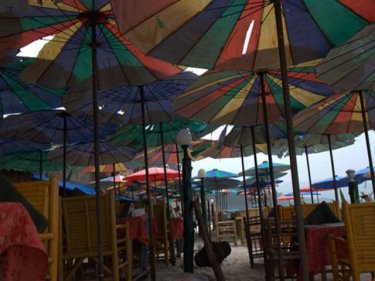CONCERNS are growing for the jobs of Phuket workers at resorts and in ancillary industries as revenue from tourism continues to run at well below normal levels.
Bhuritt Maswongssa, Marketing Officer of the Thai Hotels Association (Southern Chapter) says that occupancy rates are at 60 percent for November-December on Phuket.
''This is well below the 80 percent that could be expected in a normal high season, and the room rates are also substantially discounted,'' he said.
''Inevitably, this means problems for resorts and their staff early in the new year.''
Discount packages meant that people who normally paid for five-star or four-star accommodation were enjoying the same facilities at two-and-a-half star to three-star prices, he said.
This is turn puts pressure on three-star resorts.
Khun Bhuritt warned that lay-offs were likely. This would be the second high season in a row where owners were unable to gain sufficient income to sustain all their staff through the coming low season.
He said it was time for attempts to be made to seek alternative models. For example, although dynamic pricing has become popular, some resorts might find it more productive to charge the same set room rate all year long.
Different approaches would be required for long-term survival.
''The social consequences of an extended period of downturn will also bring problems for Phuket,'' Khun Bhuritt said. ''Crime could become more of an issue.''
Concessions have already been made at many resorts to cope with lower tourism figures that followed the record 2007-2008 high season. The invasion of Phuket airport by political protesters in August 2008 signalled a dramatic decline in tourist numbers.
While that decline appears to have finally levelled off, it has come at a high cost. Discounting has restored the numbers, but at vastly reduced levels of revenue.
And restoring rates to 2007 levels, as resort managers will tell you, is extremely difficult given the ''cannibal'' effect on Phuket and the customers' wide range of choices at other destinations suffering similar setbacks.
Many resort management teams have so far tried to keep all staff by imposing reduced working hours.
While hotels on Phuket have traditionally retained large numbers of staff, some operators more recently have opted to employ fewer people but at higher rates of pay . . . and expectations of more intense workloads.
The concept of smaller numbers of fulltime staff, with a larger pool of seasonal or casual workers, is also being looked at closely.
Resorts that have a special relationship within local communities will not find enforced change easy. Inevitably, there is a flow-on effect.
Tourism's associated industries, restaurants, entertainment, tours and diving, are also feeling the crunch because the tourists who are coming do not have large amounts to spend.
Even if all the rules are followed and special allowances are made for sacked workers, the process is invariably traumatic.
Phuket, it seems, can expect a tearful new year.





Have you guys in charge of Phuket ever thought about that there could be also other reasons than economic downturn not to come to Phuket anymore? I and a couple of friends were regular visitors to Phuket for seven years until 2008.
We always came in march and brought our bicycles with us to prepare for the european bicycle season. But now we found the traffic, driving skills of most people here and road conditions are simply too dangerous to train here anymore...sometimes it seems some certain species of car-driver want to kill you :(:(:(
cheers Daniel
Editor: If there are places in the world where motorists like cyclists and are happy to share the road with them, please let us know.
Posted by Daniel on November 10, 2009 21:22